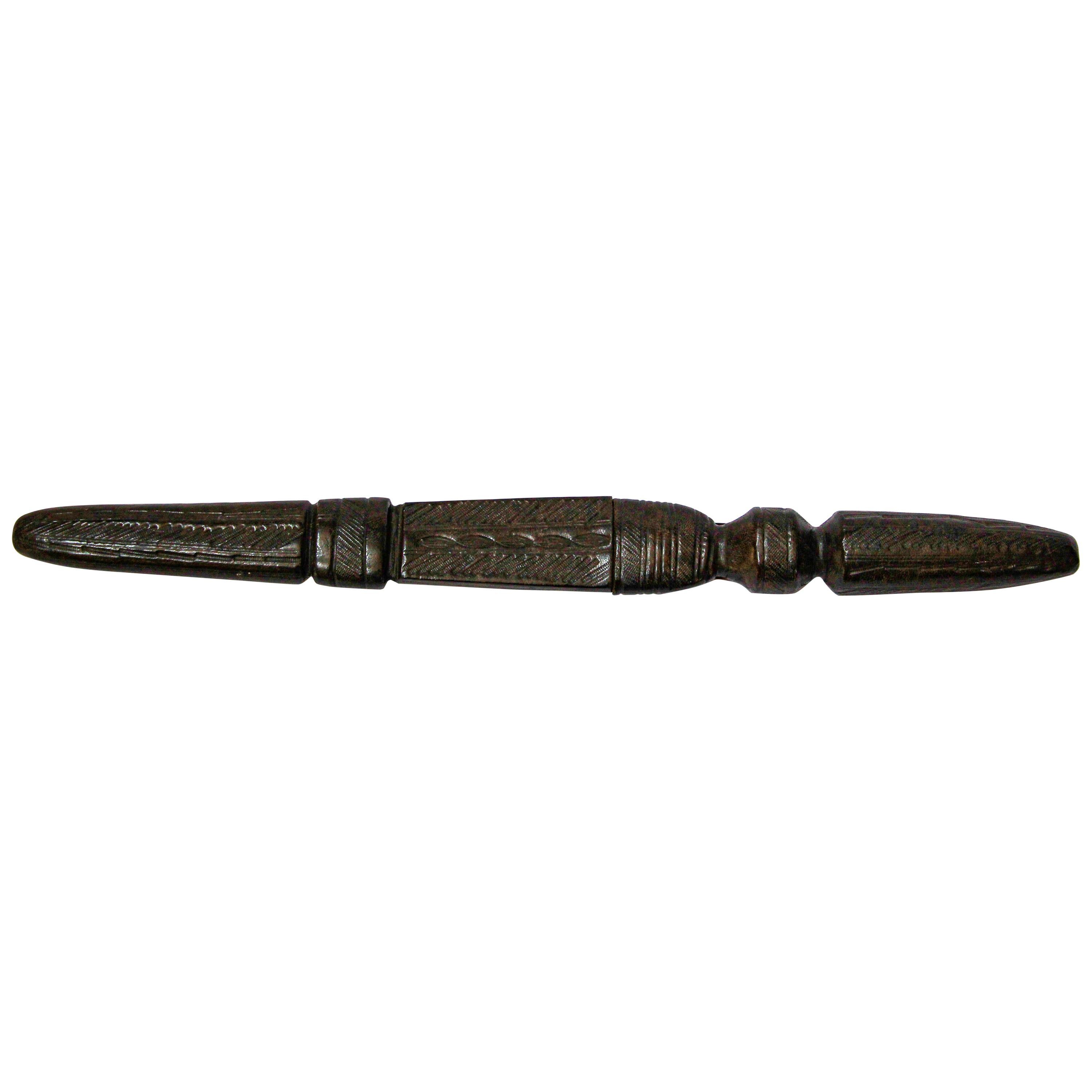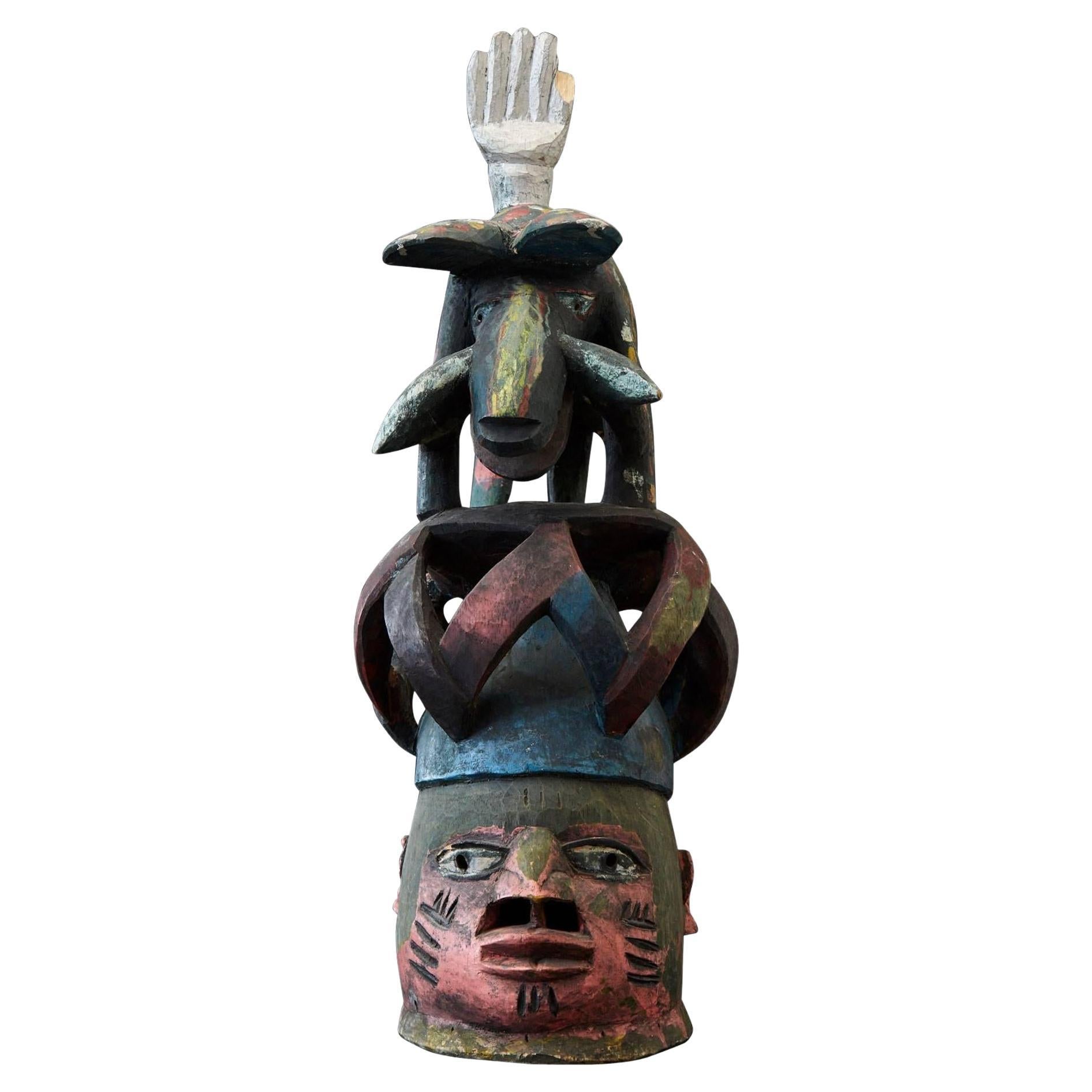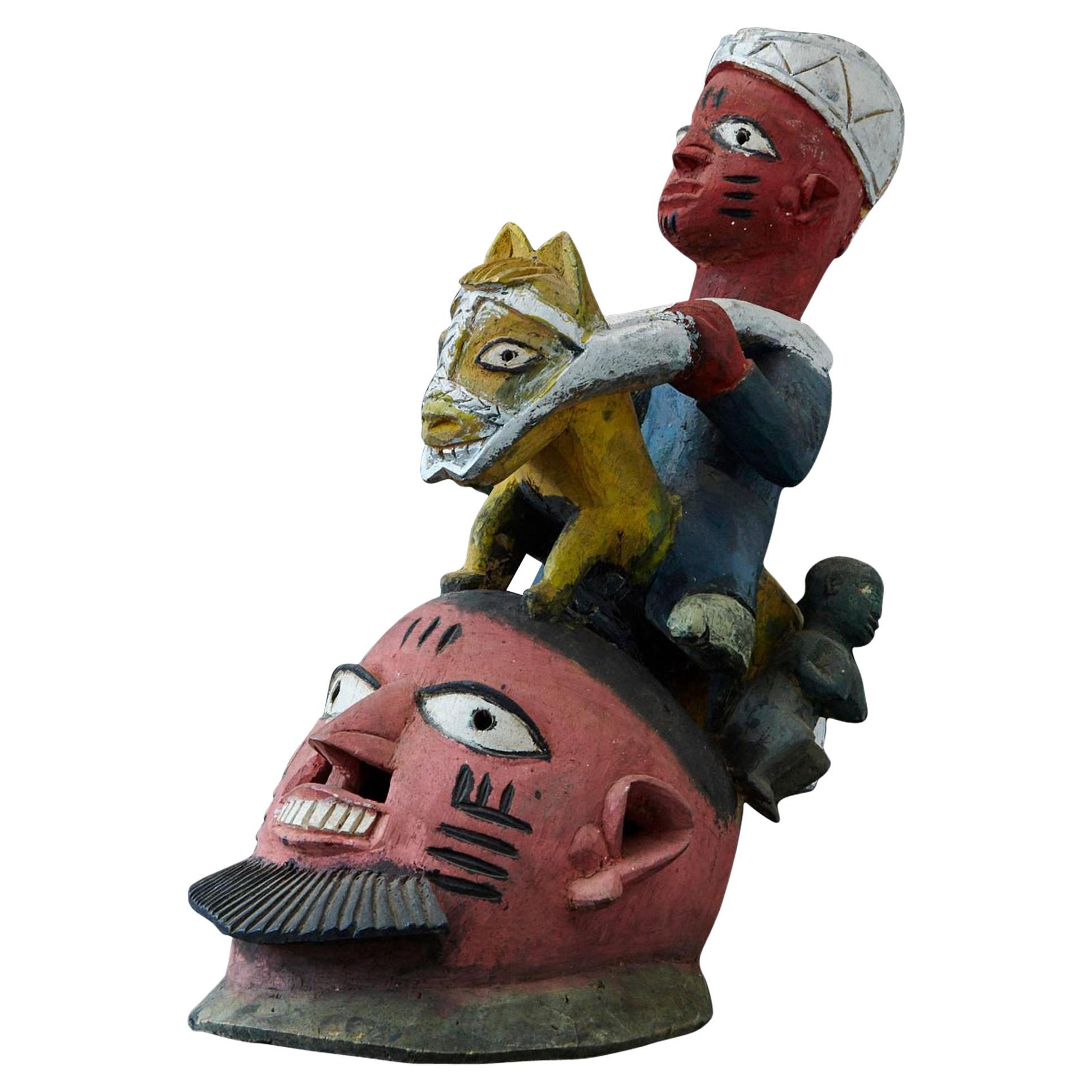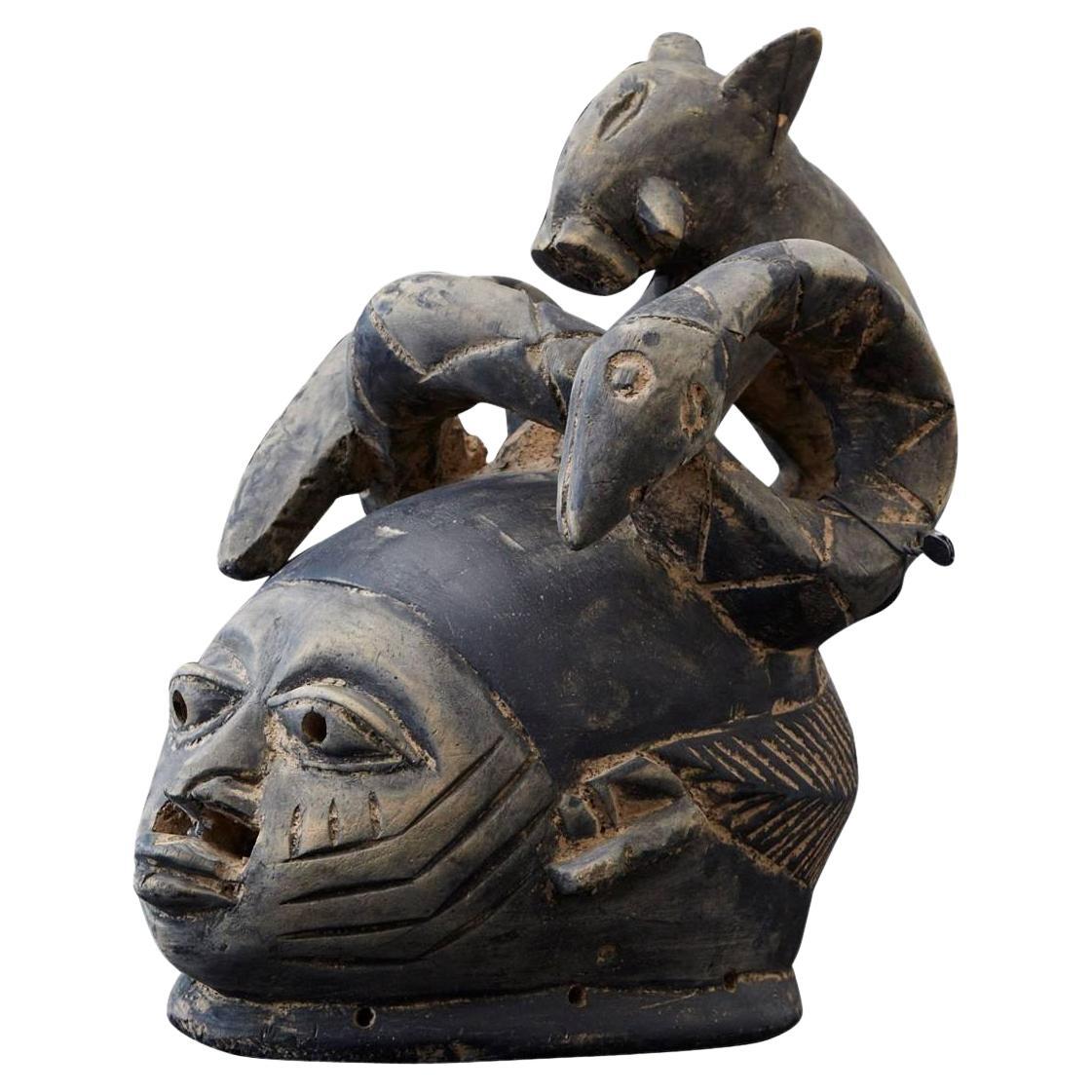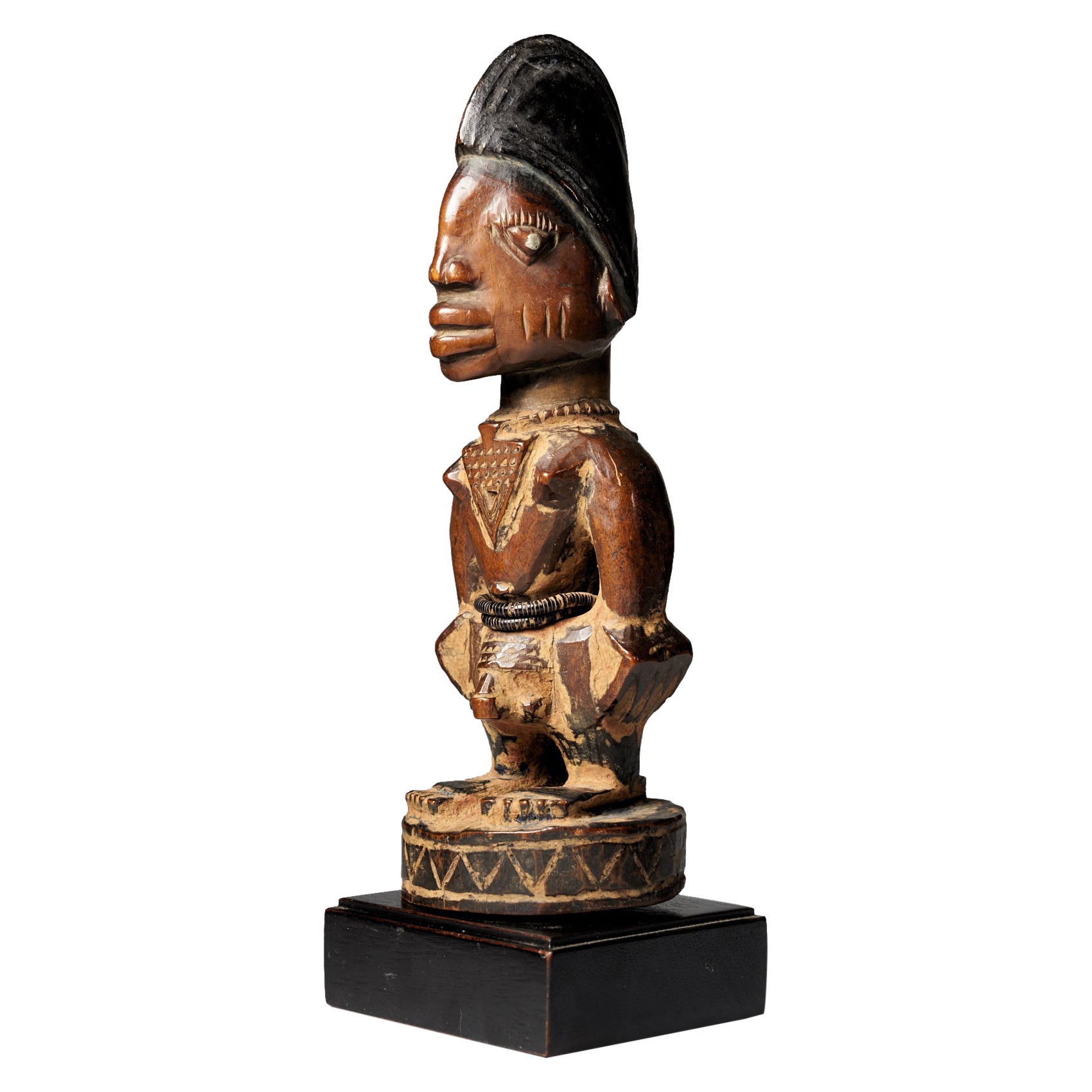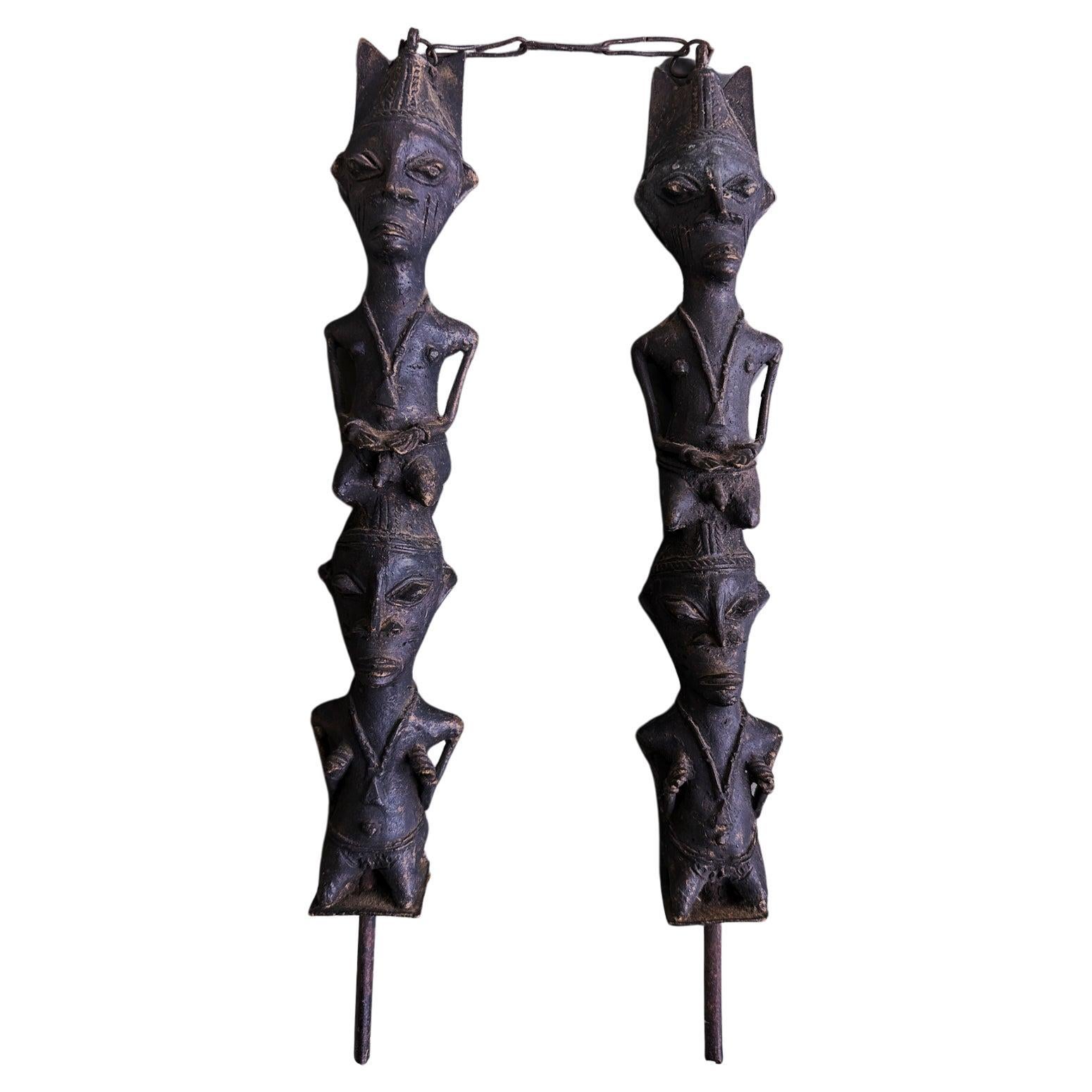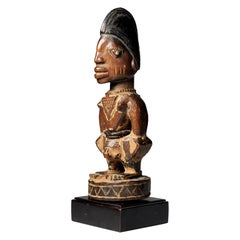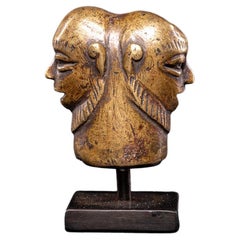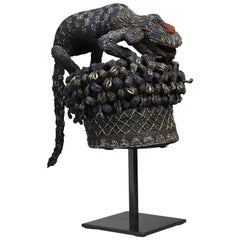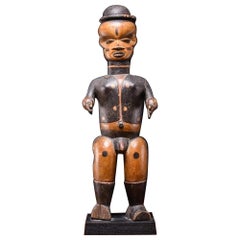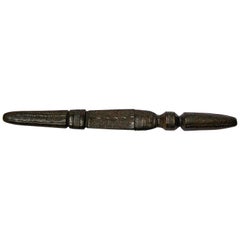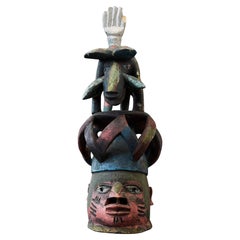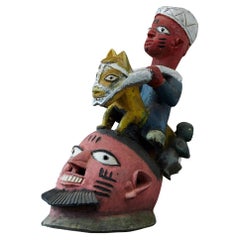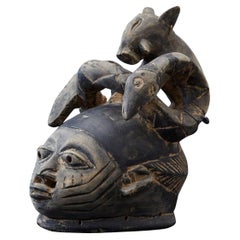Items Similar to Haussa People, Nigeria, Dagger with Organic Handle
Want more images or videos?
Request additional images or videos from the seller
1 of 5
Haussa People, Nigeria, Dagger with Organic Handle
About the Item
Beautifully crafted dager from Nigeria (Haussa People) with an organic handle.
Hausa people are frond in northwestern Nigeria and adjacent southern Niger. They constitute the largest ethnic group in the area, which contains another large group, the Fulani, perhaps one-half of whom are settled among the Hausa as a ruling class, having adopted the Hausa language and culture.
The language belongs to the Chadic group of the Afro-Asiatic (formerly Hamito-Semitic) family. It is infused with many Arabic words due to an Islamic influence, which spread during the latter part of the 14th century from the kingdom of Mali, profoundly influencing Hausa's beliefs and customs. A small minority of Hausa, known as Maguzawa, or Bunjawa, remained pagan.
- Dimensions:Height: 13 in (33 cm)Width: 0.79 in (2 cm)Depth: 0.4 in (1 cm)
- Materials and Techniques:
- Place of Origin:
- Period:
- Date of Manufacture:Unknown
- Condition:Wear consistent with age and use.
- Seller Location:Leuven , BE
- Reference Number:Seller: 271stDibs: LU3301127760042
About the Seller
5.0
Vetted Professional Seller
Every seller passes strict standards for authenticity and reliability
Established in 2017
1stDibs seller since 2017
172 sales on 1stDibs
Typical response time: 7 hours
- ShippingRetrieving quote...Shipping from: leuven, Belgium
- Return Policy
Authenticity Guarantee
In the unlikely event there’s an issue with an item’s authenticity, contact us within 1 year for a full refund. DetailsMoney-Back Guarantee
If your item is not as described, is damaged in transit, or does not arrive, contact us within 7 days for a full refund. Details24-Hour Cancellation
You have a 24-hour grace period in which to reconsider your purchase, with no questions asked.Vetted Professional Sellers
Our world-class sellers must adhere to strict standards for service and quality, maintaining the integrity of our listings.Price-Match Guarantee
If you find that a seller listed the same item for a lower price elsewhere, we’ll match it.Trusted Global Delivery
Our best-in-class carrier network provides specialized shipping options worldwide, including custom delivery.More From This Seller
View AllCarved Twin figure Ibeji Yoruba People, Nigeria
Located in Leuven , BE
A finely carved significant Yoruba Male Ibeji figure with a tall headdress, expressive eyes, original bead belt and heavy wear and polish from native use. Areas of encrusted camwood ...
Category
20th Century Nigerian Tribal Art
Materials
Wood
Bronze Alloy Staff Finial with Janiform Heads, Tiv People, Nigeria, Kunstkammer
Located in Leuven , BE
Top of a scepter sculptured in bronze alloy finial with two identical faces on both sides. Nice natural use patina. Base included in the price.
Category
Early 20th Century Nigerian Figurative Sculptures
Materials
Bronze
Beaded Royal Headress with Leopard Figure, Bamileke People, Cameroon
Located in Leuven , BE
The Beaded Royal Headdress is made of a palm tree fibre structure, enfolded with burlap cloth embroided with European glass beads that cover the entire object with geometric symbolic...
Category
20th Century Cameroonian Tribal Art
Materials
Organic Material
Ibibio Anthropomorphic Standing Male Janus Figure, Nigeria
Located in Leuven , BE
This elaborate Janus statue is a rare example of an Ibibio free-standing figure to recall a well-defined ancestor in what seems a European outfit .The Ibibios lend supernatural power...
Category
20th Century Congolese Tribal Art
Materials
Wood
Female Kifwebe Mask with old collection label, Luba-Songye People, DR Congo
Located in Leuven , BE
Traditionally, Kifwebe masks were created and worn by members of the secret masking society, Bwadi Bwa Kifwebe, of the Luba and the Songye People living in the central part of the Co...
Category
20th Century Congolese Tribal Art
Materials
Wood
Aboriginal People, Australia, Tiwi Painted Ritual Object and Clapper Sticks
Located in Leuven , BE
Aboriginal People, Australia, Tiwi painted ritual object and clapper sticks.
Category
20th Century Australian Tribal Art
Materials
Wood
You May Also Like
African Moroccan Tribal Tuareg Khoumya Leather Dagger Paper Cutter
By Berber Tribes of Morocco
Located in North Hollywood, CA
African Moroccan Tuareg tribal Khoumya arm dagger in dark brown leather sheath.
great to use as a paper cutter on desk.
Handcrafted by Artisans in south Morocco, very fine quality craftsmanship with a stamped leather engraved with Moroccan Tuareg geometric tribal designs.
The arm dagger was a weapon widely used by people across Africa in the Sahara and Sudanic Africa, from the central Sahara to North Cameroon, from Nigeria to Somalia.
It was worn in a sheath attached to the inner side of the left forearm by a loop,
Metal steel blade shows some rust, leather in very good condition.
Size: 13 inches length x widest part 1.5 inches. Blade is 1 inch.
Africa, Morocco circa 1940s.
Great Islamic antique Nomadic Tuareg knife dagger...
Category
Mid-20th Century Moroccan Folk Art Arms, Armor and Weapons
Materials
Metal
Gelede Headdress, Yoruba People, Nigeria, circa 1950s
By Yoruba People
Located in Aramits, Nouvelle-Aquitaine
Gelede festivals honor the creative and dangerous power of women elders, female ancestors and goddesses known as "our mothers". The Gelede headdress often consists of two parts, a lo...
Category
Mid-20th Century Nigerian Tribal Tribal Art
Materials
Wood
Gelede Headdress, Yoruba People, Nigeria, circa 1950s
By Yoruba People
Located in Aramits, Nouvelle-Aquitaine
Gelede festivals honor the creative and dangerous power of women elders, female ancestors and goddesses known as "our mothers". The Gelede headdress often consists of two parts, a lo...
Category
Mid-20th Century Nigerian Tribal Tribal Art
Materials
Wood
Gelede Headdress, Yoruba People, Nigeria, circa 1920s
By Yoruba People
Located in Aramits, Nouvelle-Aquitaine
Gelede festivals honor the creative and dangerous power of women elders, female ancestors and goddesses known as "our mothers". The Gelede headdress often consists of two parts, a lo...
Category
Early 20th Century Nigerian Tribal Tribal Art
Materials
Wood
Edan Staffs for Ogboni Society, Yoruba People People, Nigeria, 20th century
By Yoruba People
Located in Aramits, Nouvelle-Aquitaine
Pair of Bronze & Iron Ogboni Society staffs from the Yoruba People, Nigeria, early 20th century.
Among the Yoruba, in southwestern Nigeria, there was and still is the Ogboni secret s...
Category
Early 20th Century Nigerian Tribal Tribal Art
Materials
Bronze, Iron
Woman Sacrificing Holding Offering Bowl, Yoruba People, Nigeria, 1940s
By Yoruba People
Located in Aramits, Nouvelle-Aquitaine
Carved wooden sculpture depicting a woman sacrificing holding an offering bowl, Yoruba People,
Nigeria, 1940s
There is a small old chip on the top, please refer to the photos.
The numbers are the inventory numbers from Pennsylvania State University and Lehigh University.
Exhibited: The Pennsylvania State University - Museum of Art permanent collection;
The Lehigh University - Art Galleries permanent collection and the
Provenance: The collection of Dr and Mrs. John E. Swanson.
Dr John Swanson and his wife Marian lived from 1966 - 1981 in Lagos, Nigeria where Dr Swanson was the Advisor to the National Universities Commission and later on the Chief Planning Officer of the University Of Ibadan, Nigeria.
During their time in Africa the Swansons started to collect African art. In 1973 a part of their collection, circa 120 pieces went on loan to The Pennsylvania State University Museum of Art, where they remained until 1978.
In 1981 Dr Swanson passed away and his wife Marian never returned to Africa.
In 1982 Mrs. Swanson lent 130 pieces to the Lehigh University Art Gallery where they remained until 1987. A few pieces were also lent to Lafayette College...
Category
Mid-20th Century Nigerian Tribal Tribal Art
Materials
Wood
